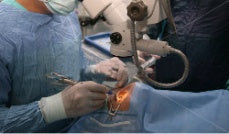
The Importance of Quality Eye Instruments for Ethical Ophthalmology
As an ophthalmologist, you know that your credibility as a medical professional depends upon more than just your knowledge and skill set. Like any professional in a service field, you're also evaluated on your ability to make ethical decisions. While we may typically think of ethics as involving doctor-patient confidentiality, an ethical ophthalmology practice is also one that consistently relies on the best surgical tools and equipment available.
Why does a commitment to quality surgical tools matter? The truth is that even the most talented, insightful ophthalmologists disserve their patients and, quite frankly, act unethically, when surgical tools and equipment are outdated, in need of repairs, or ill-suited to the specific surgery at hand. There's no amount of experience or skill that can make up for an instrument that features manufacturer defects with the potential to botch an operation. Given the intricate, delicate nature of eye surgeries, whether a limbal relaxing incision that relies on the precision of a toric marker, or an intraocular lens implant following cataract removal, one defective or inadequately-built tool can outright ruin a surgery.
Not all ophthalmological instruments are created with the same care and attention to quality as those manufactured by Rumex. When ophthalmologists neglect to ensure that the instruments they use on hundreds of patients are guaranteed by manufacturers to perform as expected, they run the risk of damaging their reputation as a respected physician or worse, incurring damage to a patient's eye. As an ophthalmologist at the head of your practice, it's ultimately your responsibility to ensure that every aspect of your operations, from patient consultations to the use of eye instruments, is carried out in an ethical manner.
How can ophthalmologists accurately identify well-made surgical instruments that will ensure patients undergo surgery that's truly safe?
- - Instruments are well-made when constructed with high-quality materials, such as non-corrosive stainless steel and titanium, both of which are guaranteed to provide durability and longevity.
- - Ophthalmologists should look for tools from manufacturers that have consulted with leaders in the field of ophthalmology. Companies that don't seek out the expertise of professionals lack the type of key insight that could lead to improvements in design and production.
- - Reliable manufacturers implement strict quality control standards that, at minimum, meet FDA criteria. At Rumex, our commitment to exceptional quality control allows us to make a 100% percent guarantee that our instruments are free of manufacturing defects and will offer exceptional performance for the duration of their use.
- - Ophthalmologists should seek instruments that feature innovations. Surgical tools made with unique, advanced features, such as ergonomic handles, indicate that a manufacturer intimately understands the industry.
Learn more about what makes for high-quality eye instruments to ensure your practice continues to operate ethically by visiting Rumex online.